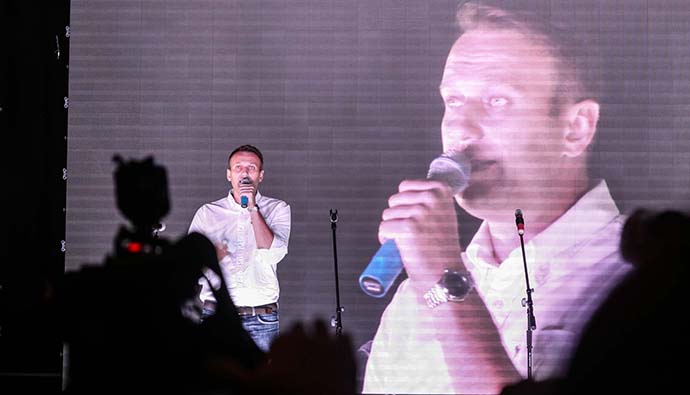Opinion: Navalny’s struggle and his legacy: a symbol of resistance and political change in Russia
Despite personal troubles and political harassment, Alexei Navalny maintained steadfastly opposed to corruption and authoritarian rule in Russia, cementing his position as a central figure in the battle for freedom and justice. His legacy lives on through those who continue to challenge power, writes Irina Sandomirskaja, Professor of Cultural Studies, in an article for Perspektiv Öst.

For many years, Alexei Navalny (1976– 2024) was one of Russia’s leading opposition politicians, becoming Vladimir Putin’s main opponent in the political arena. He was prosecuted multiple times for his political activities. The demonstrations and protests organised by his followers after the manipulation of the Russian presidential election were met with extreme violence by the police.
Navalny – the opposition politician
As an opposition politician, he was best known for his investigations of corruption among Putin’s closest circle and in United Russia, which he called the “party of crooks and thieves”. He and his co-workers founded the Anti-Corruption Foundation. He stood in parliamentary elections and was a strongly supported candidate for the mayorship of Moscow. In 2017, he even started campaigning to participate in the presidential elections, which became a significant event in Russian politics.
During his campaign, Navalny and his team established a network of campaign staff throughout Russia. With the exception of the Kremlin’s United Russia, no other politician has since succeeded in mobilising support on a comparable level. Navalny was thus essentially Putin’s only political rival that was a real threat. He led his political and citizen activism under the slogan: “The final battle between good and neutrality”, wittily expressing a deadly serious struggle.
Imprisonment and threats to his life
Navalny survived a murder attempt in August 2020 and subsequently proved that agents from the Russian security service, FSB, tried to poison him in Tomsk, during a trip to Siberia. He was transferred to Germany for treatment, but returned to Russia in January 2021 and was immediately imprisoned. Following a series of show trials, was sentenced to 19 years in prison.
While incarcerated, Navalny made use of his legal training and initiated court proceedings against the local administration and even against the entire federal penitentiary service, to defend his and his fellow prisoners’ rights. As punishment, he was subjected to massive pressure from the administration, which led to him spending 300 days (of the three years he spent incarcerated) in a punishment cell in torture-like conditions. The penitentiary service also initiated investigations targeting Navalny’s legal team. To further isolate him prior to the presidential elections planned for March 2024, he was sent to a corrective colony in the Russian Arctic.
Political struggle vs legal activism
On 16 February 2024, the Russian penitentiary service announced that Alexei Navalny had died a sudden death at corrective colony no. 3 in the village of Kharp. No official statement about the death of one of Russia’s leading politicians nor an expert statement on the cause of death has yet been published.
It could be claimed that Navalny was unique in Russia because, unlike many others in opposition, he saw his role in the political struggle for power, not within legal activism or some sort of ethical or cultural opposition to Putin’s regime. For Navalny, coming to power in a legitimate political manner was always an openly declared aim. He created his unique political movement, actively developed strategies for the power struggle and never hid his far-reaching political ambitions from the public. This deliberate politicisation of his behaviour was regarded as radicalism by some in the opposition, and made some people cautiously turn against him. His stance on the annexation of Crimea was ambivalent which, he claimed, was dictated by the country’s balance of power. After 2014, this led to many Ukrainians regarding him completely unacceptable as a political ally. However, he was undoubtedly attractive to many Russian citizens thanks to his – for a Russian politician – unusual ability to communicate and his very personal ironic manner. Younger activists particularly appreciated his way of clearly declaring his programme, his talents as an organiser and his uncompromising determination to expose “crooks and thieves” in and close to the Kremlin.
His decision to return to Russia
Navalny’s decision to return to Russia after he was poisoned was criticised at the time, and is still criticised, as a fatal mistake, a self-sacrifice to Putin and an action that was outside politics, at a symbolic level. However, through his actions, Navalny demonstrated that classic examples of citizen virtues can gain new relevance.
In Renaissance Florence, good politics was associated with traits such as fortezza and ira: strength and passion. By voluntarily handing himself over to his executioners, Navalny exhibited a modern version of this ancient republican tradition. Even closer to the present day, there are parallels with the dissidents who were killed or died by suicide in Soviet prisons and penal colonies while protesting against repressive laws and administrative arbitrariness.
Anatoly Marchenko, dissident, legal activist and author, protested for the release of all political prisoners and died in prison in 1986 as a result of a hunger strike. The Ukrainian poet, dissident and political prisoner Vasyl Stus also staged a hunger strike as a protest and died in 1985, in an isolation cell. After Navalny’s return to Russia, the chance of him dying in the “final battle between good and neutrality” was very high. But at home, his hazardous return was primarily regarded by everyone as an expression of integrity. Moving from politics to symbolic opposition to power led to Navalny significantly increasingly his circle of followers and admirers. Now her husband has been killed, Julia Navalnaya, who is also a strongly symbolic figure, has announced her desire to continue in his footsteps. In light of the tragic circumstances, her figure is the perfect symbol of resistance ethics, but Alexei Navalny’s position as the political opposition will remain empty.
Page updated
15-03-2024

